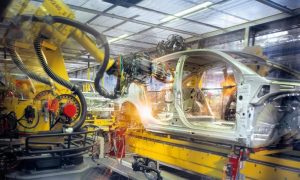

● The company presents at MWC the demo ‘Making Smart Industry happen’, where it simulates an industrial process and shows its ability to correct possible errors in industrial parts generated thanks to 5G, edge computing, data analytics and machine learning.
● Digital twins promote the efficiency and sustainability of the manufacturing process by mitigating risks, optimising resources and saving energy and commodities.
Telefónica is showing at the Mobile World Congress (MWC) its demo ‘Making Smart Industry happen’, a digital twin designed to optimise quality in the production of industrial parts and with the capacity to make decisions in real time thanks to the potential of technologies such as 5G, edge computing, data analytics and machine learning.
The digital twin that Telefónica is exhibiting at its stand features a KUKA KR4 robotic arm, manufactured by the intelligent automation solutions company KUKA, which simulates the construction of an industrial part and whose movements are synchronised with the digital representation of the robotic arm and the part. Digital twins are virtual representations of the physical environment (exact images), built in real time thanks to the low latency provided by 5G and edge computing technologies. In this way, the data generated in the industrial process are collected, modelled and analysed in the digital twin hosted at the edge, allowing real-time decisions to be made to optimise the manufacturing process and act on the industrial robot with low response times.
The demo ‘Making Smart Industry happen’ virtually recreates an industrial process with the aim of carrying out simulations aimed at making the manufacturing model more efficient and detecting possible faults in the manufacture of parts, generating actions that guarantee their quality.
The digital twin has two modes of action that in real deployments are usually based on big data and machine learning and are integrated in a dashboard: simulation and control. Through simulation, predictions are made by simulating different robot operating speeds in order to optimise its productivity while maintaining the quality of the manufactured parts. To this end, minimum quality parameters are established that the part must comply with and, if they are not, a yellow or red light is activated depending on the degree of deviation. On the other hand, the control mode shows the ability of the digital twin to detect in real time possible deviations in some manufacturing variables, such as the thickness of the printing layer of the part and the temperature of the KUKA robot.
Digital twins play a key role in the digital transformation of companies and in the creation of more competitive, efficient and sustainable business models. On the one hand, the virtual representation of physical industrial environments makes it possible to mitigate the risks associated with production and optimise the use of resources to achieve greater profitability, and on the other, it contributes to increased efficiency and energy savings, and to achieving a significant reduction in the consumption of commodities by being able to act in real time as soon as quality losses are detected in the parts.
“The digital twin is aimed at improving organisations’ real-time decision-making. In this case, the union of the digital and physical world of factories requires significant technological development (5G, edge computing, data analytics and machine learning) and allows companies to increase the accuracy of their industrial processes and reduce production time while achieving high quality rates,” says Leonor Ostos, Innovation Manager at Telefónica Spain.
“The production processes of modern factories present great challenges for managing productions with a high number of product batches and a great capacity for planning complex processes. These trends demand maximum flexibility and speed of reaction from robotic systems. In this context, 5G offers excellent bandwidth and high reliability, an essential value especially in the most demanding productions,” says Jordi Carafi, sales support team manager at KUKA Iberia.
For more information: Telefónica at MWC 2023















